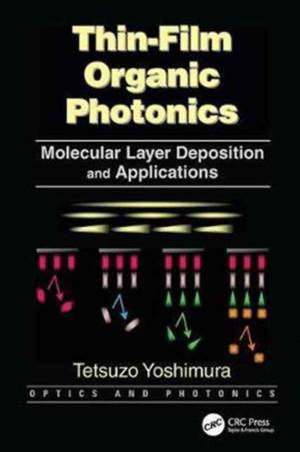
- Afhalen na 1 uur in een winkel met voorraad
- Gratis thuislevering in België vanaf € 30
- Ruim aanbod met 7 miljoen producten
- Afhalen na 1 uur in een winkel met voorraad
- Gratis thuislevering in België vanaf € 30
- Ruim aanbod met 7 miljoen producten
Omschrijving
Among the many atomic/molecular assembling techniques used to develop artificial materials, molecular layer deposition (MLD) continues to receive special attention as the next-generation growth technique for organic thin-film materials used in photonics and electronics.
Thin-Film Organic Photonics: Molecular Layer Deposition and Applications describes how photonic/electronic properties of thin films can be improved through MLD, which enables precise control of atomic and molecular arrangements to construct a wire network that achieves "three-dimensional growth". MLD facilitates dot-by-dot--or molecule-by-molecule--growth of polymer and molecular wires, and that enhanced level of control creates numerous application possibilities.
Explores the wide range of MLD applications in solar energy and optics, as well as proposed uses in biomedical photonics
This book addresses the prospects for artificial materials with atomic/molecular-level tailored structures, especially those featuring MLD and conjugated polymers with multiple quantum dots (MQDs), or polymer MQDs. In particular, the author focuses on the application of artificial organic thin films to:
- Photonics/electronics, particularly in optical interconnects used in computers
Optical switching and solar energy conversion systems - Bio/ medical photonics, such as photodynamic therapy
- Organic photonic materials, devices, and integration processes
With its clear and concise presentation, this book demonstrates exactly how MLD enables electron wavefunction control, thereby improving material performance and generating new photonic/electronic phenomena.
Specificaties
Betrokkenen
- Auteur(s):
- Uitgeverij:
Inhoud
- Aantal bladzijden:
- 370
- Taal:
- Engels
- Reeks:
Eigenschappen
- Productcode (EAN):
- 9781138075900
- Verschijningsdatum:
- 29/03/2017
- Uitvoering:
- Paperback
- Formaat:
- Trade paperback (VS)
- Afmetingen:
- 156 mm x 234 mm
- Gewicht:
- 521 g

Alleen bij Standaard Boekhandel
Beoordelingen
We publiceren alleen reviews die voldoen aan de voorwaarden voor reviews. Bekijk onze voorwaarden voor reviews.











